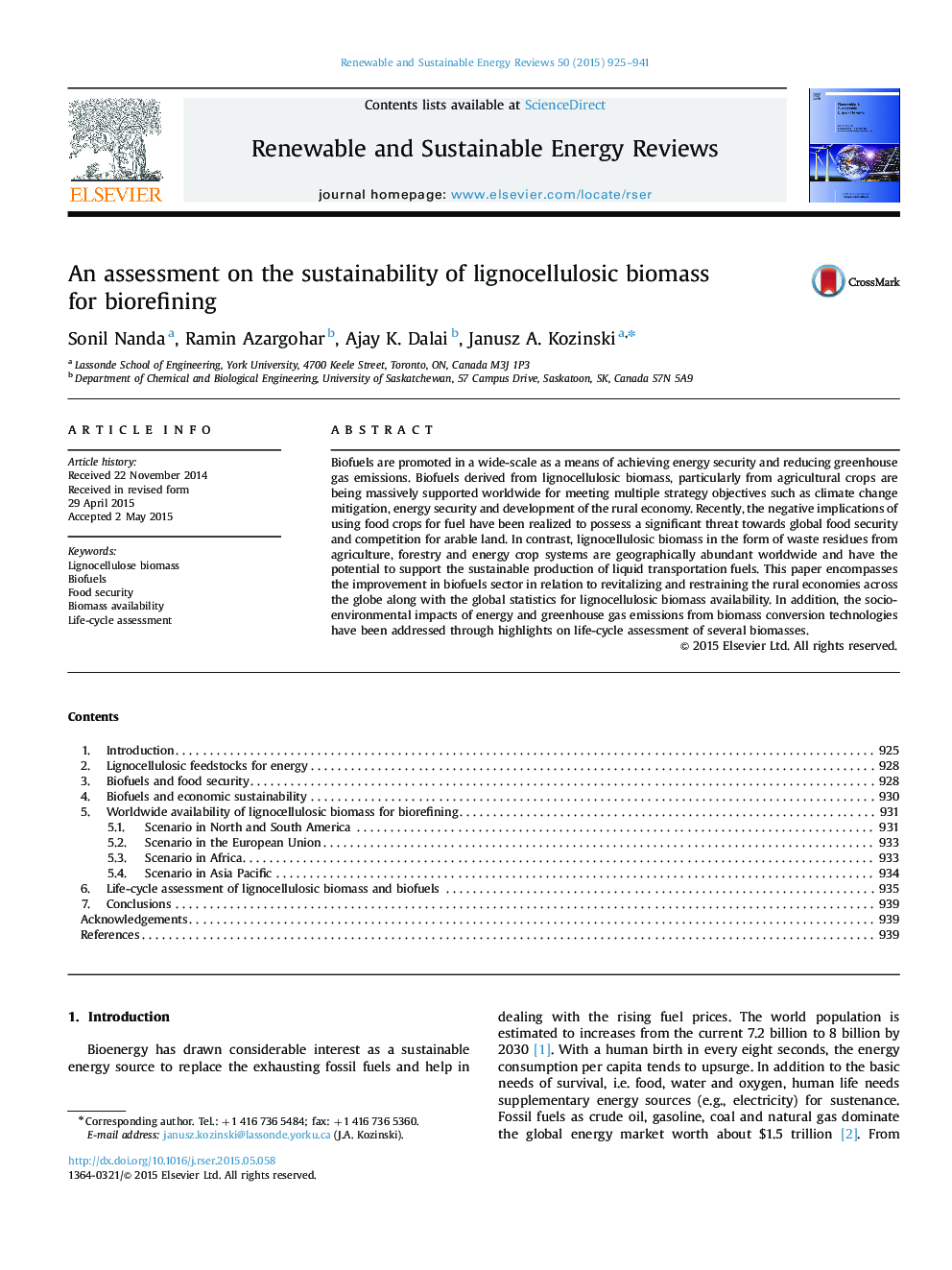| کد مقاله | کد نشریه | سال انتشار | مقاله انگلیسی | نسخه تمام متن |
|---|---|---|---|---|
| 8116242 | 1522335 | 2015 | 17 صفحه PDF | دانلود رایگان |
عنوان انگلیسی مقاله ISI
An assessment on the sustainability of lignocellulosic biomass for biorefining
ترجمه فارسی عنوان
ارزیابی پایداری زیست توده لیگنوسلولوزیک برای بیورفینینگ
دانلود مقاله + سفارش ترجمه
دانلود مقاله ISI انگلیسی
رایگان برای ایرانیان
کلمات کلیدی
زیست توده لیگنوسلولوز، سوخت های زیستی، امنیت غذایی، در دسترس بودن زیست توده، ارزیابی چرخه حیات،
ترجمه چکیده
سوخت های زیستی در مقیاس گسترده به عنوان وسیله ای برای دستیابی به امنیت انرژی و کاهش انتشار گازهای گلخانه ای ارتقا یافته اند. سوخت های زیستی مشتق شده از زیست توده لیگنوسلولوزی، بویژه از محصولات کشاورزی، به طور گسترده ای در سراسر جهان مورد حمایت قرار می گیرند تا به اهداف استراتژی چندگانه مانند کاهش تغییرات اقلیمی، امنیت انرژی و توسعه اقتصاد روستایی برسند. به تازگی، پیامدهای منفی استفاده از محصولات غذایی برای سوخت، به خطر افتاده است و تهدیدی برای امنیت غذایی جهانی و رقابت برای زمین های زراعی است. در مقابل، زیست توده لیگنوسلولوزی به شکل ضایعات زباله از سیستم های کشاورزی، جنگلداری و سیستم های انرژی انرژی از لحاظ جغرافیایی فراوانی در سرتاسر دنیا دارد و دارای قابلیت حمایت از تولید پایدار سوخت های مایع می باشد. این مقاله شامل بهبود در بخش سوخت های زیستی در ارتباط با احیای و محدود کردن اقتصادهای روستایی در سراسر جهان همراه با آمار جهانی برای دسترسی به زیست توده لیگنوسلولوزی است. علاوه بر این، اثرات اجتماعی و محیطی انرژی و انتشار گازهای گلخانه ای از فن آوری های تبدیل زیست توده، با توجه به اهمیت ارزیابی چرخه حیات چندین ماده بیولوژیکی، مورد بررسی قرار گرفته است.
موضوعات مرتبط
مهندسی و علوم پایه
مهندسی انرژی
انرژی های تجدید پذیر، توسعه پایدار و محیط زیست
چکیده انگلیسی
Biofuels are promoted in a wide-scale as a means of achieving energy security and reducing greenhouse gas emissions. Biofuels derived from lignocellulosic biomass, particularly from agricultural crops are being massively supported worldwide for meeting multiple strategy objectives such as climate change mitigation, energy security and development of the rural economy. Recently, the negative implications of using food crops for fuel have been realized to possess a significant threat towards global food security and competition for arable land. In contrast, lignocellulosic biomass in the form of waste residues from agriculture, forestry and energy crop systems are geographically abundant worldwide and have the potential to support the sustainable production of liquid transportation fuels. This paper encompasses the improvement in biofuels sector in relation to revitalizing and restraining the rural economies across the globe along with the global statistics for lignocellulosic biomass availability. In addition, the socio-environmental impacts of energy and greenhouse gas emissions from biomass conversion technologies have been addressed through highlights on life-cycle assessment of several biomasses.
ناشر
Database: Elsevier - ScienceDirect (ساینس دایرکت)
Journal: Renewable and Sustainable Energy Reviews - Volume 50, October 2015, Pages 925-941
Journal: Renewable and Sustainable Energy Reviews - Volume 50, October 2015, Pages 925-941
نویسندگان
Sonil Nanda, Ramin Azargohar, Ajay K. Dalai, Janusz A. Kozinski,
